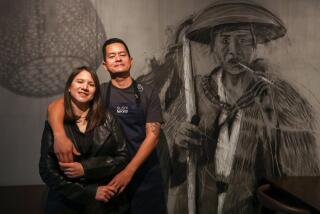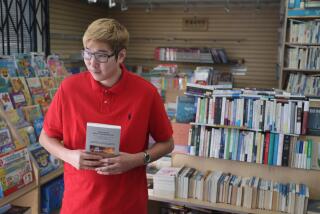Salesman Was One for the Book
- Share via
Arthur Miller once said that Willy Loman died because he foolishly believed it was a law that someone who wasn’t a success didn’t deserve to live. Ki Yup Chang’s was the opposite tragedy. He believed in the system, and it rewarded him. He richly deserved a longer life. Nevertheless, his too was the death of a salesman.
Chang was already 49 when he came to this country, emigrating from Korea with the same hopes for a better life as millions of immigrants before him. That was about 20 years ago. In 1974, he somehow ended up at an Encyclopaedia Britannica office in Los Angeles.
His English was still only rudimentary, but that wasn’t the barrier it might at first seem, because this wasn’t where they edit the learned articles on paleontology and piezoelectricity. The idea here was to sell books.
Chang wasn’t much good at first, and therefore didn’t make much money; Britannica salesman are independent contractors who live on commissions alone. But Chang wasn’t the only Korean who has come here in recent years. The 1990 Census found 259,941 Korean-Americans in California, up 153% since 1980. Of those, 145,431 were in Los Angeles County, where the Korean-American population had grown 141%.
And if Chang didn’t understand much English, he understood Koreans pretty well. One thing he knew was that Korean immigrants are often passionate about their children’s education. Chang was the same way himself.
“He started very slowly,” recalls Ed Gagliardi, Britannica’s western regional vice president and Chang’s boss. But business soon picked up: “After six months, he was selling two or three sets a week, strictly in the Korean community.”
Chang immersed himself in local Korean affairs, eventually becoming an elder in a Koreatown church, where he spent much of his spare time.
He kept in touch with Korean immigrants as they arrived. He became a family friend. They got to know him. And they bought.
He worked tirelessly, logging 50 to 70 hours a week. He would sit and make calls late into the night and then rise early to visit Korean shopkeepers in the morning, before they opened their stores.
“Sometimes I’d look in and he’d be asleep at his desk,” recalls Dan Klein, a Britannica district manager.
Chang’s tenacity was renowned. Klein says Chang visited prospects again and again, even picking up the kids at school if the parents were too busy. His manners were courtly.
James Cubbage, also a district manager, recalls introducing his daughter to Chang: “She remembers because he was the first man who ever bowed to her.” And his attire was fastidious: He never turned up without an immaculate coat and tie.
Before long, Ki Yup Chang was selling more encyclopedias--a lot more. He was selling them by the crate, in fact. He was selling Encyclopaedias Britannica better than practically anyone, before or since.
In 1977, he won the company’s William Benton Award as its No. 1 seller in America. In 1982, he won it again, and again in 1983 and 1984.
“He was a close second or third in every other year,” Gagliardi says.
Understand that the Encyclopaedia Britannica is not a little thing. A reasonable summary of human knowledge, it runs 32 volumes and sells today for $1,899. In his best years, Chang sold 400 annually--”more than one set a day,” Gagliardi says with reverence.
The customers were parents such as Spencer Cho, a Korean immigrant who became a successful real estate broker in Palmdale. He and his wife bought a set from Chang for their two children. Before long, Ki Yup Chang, the Korean immigrant with the broken English, was known throughout the Britannica empire.
“He was a really great salesman,” says Woo Jin Chang, one of his sons, in an understatement akin to observing that Ted Williams had a knack for hitting.
His former colleagues speak of Chang with a kind of awe. “He reached plateaus that were unattainable to the rest of us,” Klein says.
“Your accomplishments are legendary inside Britannica,” wrote Peter Norton, president of Encyclopaedia Britannica USA, in a 1985 letter of commendation that referred to Chang as “an inspiration.”
Indeed. Ki Yup Chang came from Korea, made good in business, raised a lovely family in a nice house in Northridge and saw his children graduate from fine universities and become successful professionals.
All the while he was dying. More than 30 years ago he contracted hepatitis, and by last year it had destroyed enough of his liver that, on April 8, 1991, he was given a transplant at UCLA Medical Center.
Death took Ki Yup Chang at 3:33 p.m. last July 17. He was 68 and no Willy Loman, thank God. But at Britannica, and everywhere else he went, the life of this salesman won’t soon be forgotten. This obituary of sorts is long overdue.
More to Read
Sign up for Essential California
The most important California stories and recommendations in your inbox every morning.
You may occasionally receive promotional content from the Los Angeles Times.













